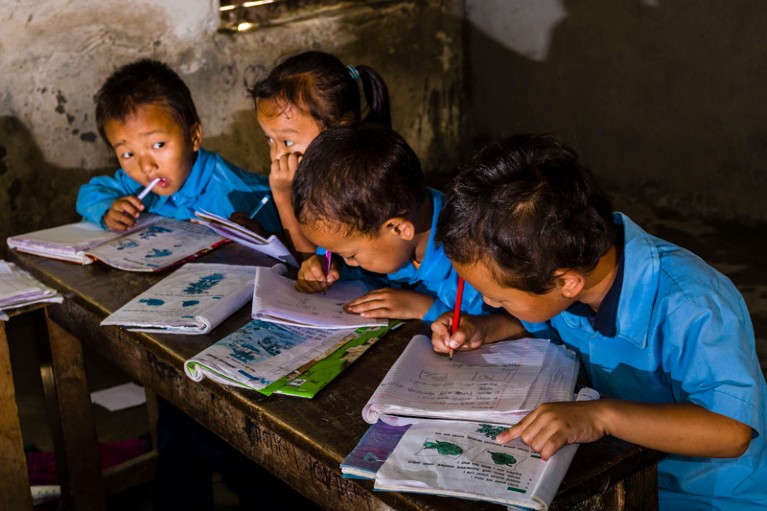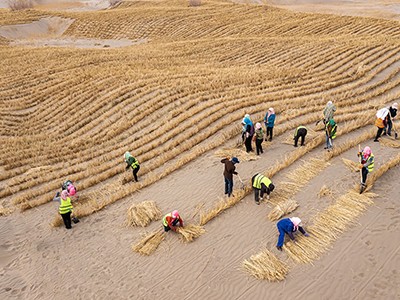
Voluntary campaigns to clean up beaches in Ghana are helping to provide data about marine litter.Credit: Let’s Do It Ghana
The world is more than halfway through the United Nations’ 2030 Agenda for Sustainable Development, which was agreed in 2015 by 193 countries. Yet only 17% of measurable targets for the Sustainable Development Goals (SDGs) are on track to be achieved by the end of this decade1. A course correction and a renewed push are needed. Both hinge on a crucial element — data.
Data relevant to the SDGs are riddled with gaps. Geographic coverage is patchy, information collection is often slow, and crucial data about marginalized groups are missing. Fewer than half of the world’s countries have been able to report internationally comparable data since 2015 on key goals such as climate action, gender equality and governance.
Extending the Sustainable Development Goals to 2050 — a road map
The reasons for these shortcomings include a paucity of funding, lack of coordination, inadequate technical capacities and limitations of conventional data-collection methods. National statistical offices (NSOs) are at the heart of data gathering, yet many, especially in low- and middle-income countries (LMICs), are severely underfunded2.
Meanwhile, for conventional data sources such as censuses and surveys, response rates are generally declining and costs increasing. The most marginalized groups are hard to reach. In 2021, around 40% of countries reported difficulties in collecting data on migrants, and 27% faced challenges in gathering data on older people and those with disabilities3.
Citizen data can fill these gaps and make data and policy more inclusive — but only if NSOs, civil-society organizations, academia and communities join forces.
Here, we outline steps taken by the UN, country statisticians, civil-society groups, human-rights institutions and development partners to widen and harmonize data collection from official bodies and community groups, through the Copenhagen Framework on Citizen Data. And we outline what needs to happen next for this framework to be implemented.
Bring citizens and officials together
Citizen data initiatives are supplementing official data collection in many countries. For instance, in India, citizen data on SDGs have revealed challenges among disadvantaged groups such as the Musahar community in the state of Bihar and the Gosava, a nomadic tribe in the state of Maharashtra. These groups have less access to state welfare programmes, such as provision of subsidized foods and cylinder gas, compared with national averages. Citizen data collection has helped the communities to gain access to government-supported welfare4.
In Kenya, data gathered from Indigenous communities in 2022 highlighted challenges they faced in accessing health care and education. This prompted local government and aid donors to provide more-accessible maternity wards and implement safety measures for children having to travel on dangerous routes to attend schools5.
In Nepal, community-led data collection identified language barriers faced by Indigenous children during schooling, according to presentations at an August 2023 workshop in Kathmandu. As a result, local-government policies were adjusted to incorporate Indigenous-language instruction for schools.
What scientists need to do to accelerate progress on the SDGs
In Ghana, citizens helped to fill the SDG data gap on marine litter6. Data generated through citizen-organized beach-cleaning campaigns were compiled and standardized to contribute to official reporting on the SDGs. These data also prompted the country’s Environmental Protection Agency to implement policy changes to keep beaches clean.
Such efforts are laudable. But the value of citizen data can be amplified by bringing such projects under the umbrella of a national data ecosystem. And that means bringing groups that collect citizen data and official statistics together.
Such bridging is already under way in Kenya. Indigenous Livelihood Enhancement Partners, a Kenyan civil-society organization collecting data in Indigenous communities, views the integration of its information into official statistics as recognition by state institutions that government policies need to be further strengthened with community-generated data. At the same time, the Kenya National Bureau of Statistics acknowledges the value of collaboration with civil-society organizations, which provide supplementary data where the bureau lacks the resources and capacity to fill all the gaps.
Establishing connections between groups collecting citizen data and the official statistical bodies goes beyond merely integrating data sources or legitimizing what is produced outside the scope of official programmes. It is about empowering citizens and communities to influence issues that impact their lives.
Involving civil-society organizations in close collaboration with the official statistical system helps to build trust between citizens and state institutions. Although citizens might be hesitant to respond to official surveys and censuses — because they have little control over what is measured and how data are used — they can become key contributors when they lead or co-produce data. This involvement allows them to influence what is measured and how it is measured, ensuring that the data collected can have a meaningful impact on their lives.
A framework to align efforts
In the past 18 months, an international framework has been drawn up to foster a closer relationship between state institutions and citizens in the production of data and statistics.
At the 2023 World Data Forum in Hangzhou, China, the UN established an effort called the Collaborative on Citizen Data. This led to the first draft of the Copenhagen Framework on Citizen Data7 — a set of guidelines designed to engage all data communities and leverage citizen data to give a voice to all groups to inform decision-making. It is intended to accelerate SDG implementation and uphold its overarching ‘leave no one behind’ principle.

Schoolchildren in Tatopani, Nepal.Credit: Frank Bienewald/LightRocket/Getty
In February this year, chief statisticians from around the world gathered at the UN Statistical Commission in New York City. They expressed their support for the work on citizen data, and encouraged the collaborative to expedite its work. The framework and its implementation plan are expected to be finalized by the end of this year and submitted to the commission’s next gathering in March 2025, so that statisticians around the world will have a globally recognized tool for working with citizen data.
The UN’s emphasis on citizen engagement in data production is pivotal for three reasons. First, it recognizes that grass-roots and community groups must have a voice in what is being measured, and how. Second, it aligns with the human-rights-based approach to data, which is grounded in the principles of dignity, equality and non-discrimination and is aligned with international human-rights standards8. Third, it challenges conventional practice in state-led data collection, in which citizens are often merely respondents, by advocating for their involvement at all stages of the ‘data value chain’.
The framework defines citizen data broadly — as coming from any initiative that engages citizens sufficiently, whether led by citizens or state entities. And it provides a five-point scale to define levels of engagement. The implementation guide will be drawn from national and local experiences.
Bucking the system: the extraordinary story of how the SDGs came to be
The framework also establishes ten principles for citizen data. These encompass: independence; relevance; participation and informed consent; professional standards; data security; self-definition and self-identification; transparency; ethical and safe production and data use; confidentiality; privacy and data attribution; and openness and accessibility.
These are built on existing data and statistical principles, including those for official statistics8, citizen science9 and human-rights-based approaches to data8,9 (see also go.nature.com/4dpn9d2). They also consider the unique aspects of citizen data such as the emphasis on participation, informed consent, and self-definition and self-identification.
The framework outlines other crucial elements to enable sustainable production and use of citizen data, such as adopting a whole- of-society approach through partnerships and building trust; fostering a legal environment that addresses data privacy, ownership and control by citizens, and that encourages the recognition of data produced by citizens; building inclusive statistical and technical infrastructure that does not leave marginalized population groups behind; enhancing the skills of all partners; and funding the production and use of citizen data.
The framework also provides a road map for implementation. This includes building partnerships between state and non-state institutions, running pilots with national partners to ensure practical applicability, and supporting data communities including NSOs, civil-society organizations and other national entities, such as local government and human-rights institutions.
Next steps
Implementing the framework is far from trivial. Unlike data-collection programmes under an official statistical system, for which a clear governance structure exists, citizen data initiatives are typically small-scale and diverse in nature, scope and focus. And NSOs have limited legal mandates and resources that can restrict their ability to integrate and validate citizen data.
Implementing quality assurance for citizen data is also challenging. Citizen data are often qualitative and geographically limited. They are collected by a wide range of organizations and groups, with different levels of technical capacity, often without the guidance of established principles or regulation under national laws or legal frameworks.
The Copenhagen framework and its road map provide a good pathway to start addressing these challenges. However, further efforts should be made to encourage official statistical communities to expand their mandates and outreach to include citizen data.
Three priorities
First, to address diversity and scale differences, the Collaborative on Citizen Data is offering guidance on coordinating the various initiatives at the national level, and on the development of national road maps. Countries that have established platforms under the SDG framework to engage civil-society organizations offer valuable lessons, and can serve as starting points for citizen-data initiatives.
For example, Kenya’s SDGs Kenya Forum provides a mechanism to allow more than 350 civil-society organizations and the NSO to work together. Similarly, in Kyrgyzstan, the NSO is integrating some of the data collected by civil-society organizations, the idea being to use this information in the voluntary national review of SDG strategies. This came about because a preparatory stocktaking exercise on citizen data, conducted with support from the UN Statistics Division, alerted the NSO to the resources collected by civil-society groups.
To build a better world, stop chasing economic growth
Second, the collaborative is focusing on developing guidance to assure data quality. Qualitative citizen data tend to focus on specific areas or issues, whereas official statistics are predominantly quantitative. Bridging these differences requires an assessment of how the official statistical-quality framework10 can be adapted to citizen data to establish a quality-assurance framework that is fit for purpose. The collaborative has established a group of experts to put together this guidance, aiming to achieve a level of quality that will enable citizen data to be disseminated and to be used and reused, while maintaining the degree of flexibility needed for civil-society organizations to operate in their communities.
The third priority is to enable NSOs to establish partnerships with civil-society organisations. Several challenges must be addressed. Legal frameworks often focus narrowly on data produced by state institutions, limiting engagement with civil-society data owing to restricted mandates and resources of NSOs. These frameworks need to be expanded to support broader collaboration. For example, Colombia and New Zealand have both enacted laws in the past two years to expand the mandates of their NSOs to encompass broader data types, including statistics produced by non-state institutions.
The guidance and training materials being developed by the collaborative aim to build capacity for national statistics offices to integrate citizen data. They will focus on technical aspects but also on the development of skills, advocacy and data communication and open-data principles to maximize the value and impact of citizen data.
The task ahead is both exciting and daunting. No single institution can offer all the solutions to address the data needed to achieve the SDGs. The work of the collaborative has demonstrated the power of groups coming together to create a system for data that is inclusive and can ensure proper representation of all individuals.




